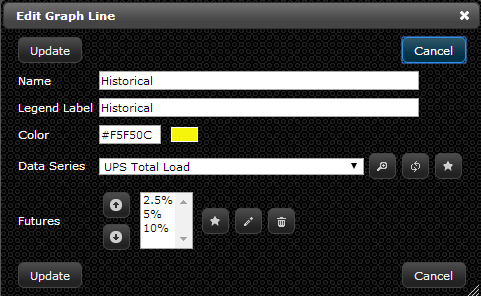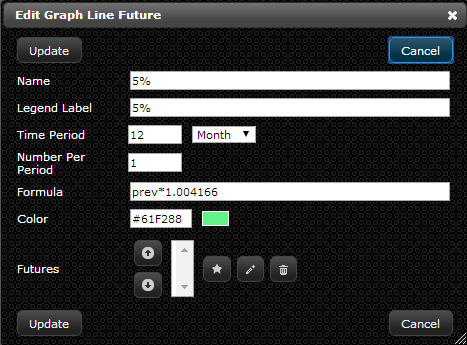Difference between revisions of "Graph"
Jump to navigation
Jump to search
| Line 62: | Line 62: | ||
<li>Define a color for the Future Graph Line in the “Color” field</li> | <li>Define a color for the Future Graph Line in the “Color” field</li> | ||
<li>Click “Add”</li> | <li>Click “Add”</li> | ||
| + | [[File:Graph-Line-Future.png]] | ||
</ol> | </ol> | ||
| − | + | <li>Click “Add” on the “Create Graph Line” window</li> | |
</ol> | </ol> | ||
| − | + | <li>Click “Create” on the “Create Graph” window</li> | |
| − | + | <li>You now have a graph that will continue to update automatically and always be available for a real-time view in LiveDC</li> | |
| − | |||
| − | |||
| − | |||
| − | |||
| − | |||
| − | |||
| − | |||
| − | |||
| − | |||
| − | |||
| − | |||
| − | |||
| − | |||
| − | |||
| − | |||
| − | |||
| − | |||
| − | |||
| − | |||
| − | |||
| − | |||
| − | |||
| − | |||
| − | |||
| − | |||
| − | |||
| − | |||
| − | |||
| − | |||
| − | |||
| − | |||
| − | |||
| − | |||
| − | |||
| − | |||
| − | |||
| − | |||
| − | |||
| − | |||
| − | |||
| − | |||
| − | |||
| − | |||
| − | |||
| − | |||
| − | |||
| − | |||
| − | |||
| − | |||
| − | |||
| − | |||
| − | |||
| − | |||
| − | |||
| − | |||
| − | |||
| − | |||
| − | |||
| − | |||
| − | |||
| − | |||
| − | |||
| − | |||
| − | |||
| − | |||
| − | <li>You now have a | ||
</ol> | </ol> | ||
</ol> | </ol> | ||
Revision as of 09:28, 11 July 2014
A Graph within LiveDC is used to show historical changes in your data. Fed by specified Data Series, a Graph will provide valuable insight into trends and expectations around what to expect in the case of an outage, disruption, and the future.
Creating a Graph
- On the navigation menu (left-hand side) click “Visuals” and then “Graphs” this will open a new tab titled “Graphs”
- Within the Graphs tab, in the upper left-hand corner click the “Create” button. A new window will open up called “Create Graph”
- Enter the name of the Graph in the “Name” field
- Examples: Server Changes, Temperatures (Hot Aisles), UPS Capacity, etc.
- Enter any additional information about the Graph in the “Details” field
- Enter a title in the “Title” field that be displayed when the Graph is generated
- Enter a label for the X-axis in the “Axis Label” field
- Examples: Temperature (F), kW, Month, etc.
- Select a size for the Graph in the “Size” drop-down menu
- Small, Medium, or Large - this will determine the detail and resolution of the graph when displayed
- Define a time period for the Graph to display in the “Time Period” section
- We usually look over the last month or last 3 months (previous quarter)
- Add Lines to the Graph by clicking on the star button to create a new “Graph Line” record. In the “Create Graph Line” window enter the following:
- Enter the name of the Line in the “Name” field
- Examples: Physical Servers, Average Temperature, Historical Power, etc.
- Enter a name for the legend of this Line in the “Legend Label” field
- Examples: Historical, Max Temp, Physical Servers, etc.
- This label will appear at the bottom of the graph along with the color of the line it is representing
- Select a color for the Graph Line in the “Color” section
- Select the “Data Series” that will provide the data for the Graph Line in the drop-down menu or create a new “Data Series” record by clicking the star button (See “Creating a Data Series” section for instructions)
- Add a future line to show how the Graph Line could change in the future by clicking the star button to create a new “Futures” record. In the “Create Graph Line Future” window enter the following:
- Enter the name of the Graph Line Future in the “Name” field
- Example: 2.5%, 5%, 10%, etc.
- Enter a label for the Legend in the “Legend Label” field
- Example: 2.5%, 5%, 10%, etc.
- Define the period of time the Graph will extend into the future in the “Time Period” section
- Example: 24 months
- Enter the “Number Per Period” identifier which outlined how many times you want to provide a value each month as outlined in section 3 above.
- Example: 1 is the standard value here
- Enter a formula for the Future Graph Line in the “Formula” field
- See image below for syntax: prev*1.004166 refers to a 5% growth rate for the year, broken down to the monthly increase
- Define a color for the Future Graph Line in the “Color” field
- Click “Add”
- Click “Add” on the “Create Graph Line” window
- Click “Create” on the “Create Graph” window
- You now have a graph that will continue to update automatically and always be available for a real-time view in LiveDC

